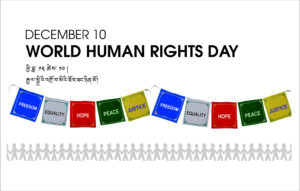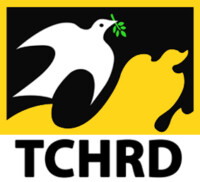 On the 71st anniversary of the Universal Declaration of Human Rights (UDHR), the Tibetan Centre for Human Rights and Democracy (TCHRD) calls on the UN member-states to defend universal human rights by protecting civil society expression.
On the 71st anniversary of the Universal Declaration of Human Rights (UDHR), the Tibetan Centre for Human Rights and Democracy (TCHRD) calls on the UN member-states to defend universal human rights by protecting civil society expression.
This call comes at a time when civil society voices are under attack in many places around the world. In particular, the supression of civil society by the government of the People’s Republic of China (PRC) has entailed mass surveillance, complete restriction of communication channels, harassment, and intimidation of human rights activists and informants. This clampdown has caused countless human rights violations in Tibet to go unreported.
The 71 years of the UDHR bear testimony that a free, diverse, and pluralistic civil society is indispensable for the promotion and protection of human rights and fundamental freedoms. “According space to civil society is not optional”, said the UN High Commissioner for Human Rights. Concerned by the shrinking space for civil society, the comissioner stated, “[h]uman rights impose obligations on States to respect, protect and fulfil the rights of every individual to freedom of opinion and expression, access to information, peaceful assembly and association and the right to participate in public affairs and to protect individuals from interference, including by non-State actors.”
In recent years, the PRC under the leadership of President Xi Jinping has sought to influence critical human rights institutions by isolating CSOs from human rights mechanisms. Paving the way for other governments to block essential voices, the PRC is ushering in a new era wherein civil society is silenced, and the human rights system is corrupted.
To compel Beijing and like-minded governments to respect, promote and protect a free, diverse and pluralistic civil society, TCHRD staff members delivered an appeal letter to the embassies of 135 UN member-states based in New Delhi from 4 to 6 December this year. A greeting card celebrating the 71st anniversary of World Human Rights Day accompanied the letter. A copy of the letter was also submitted to the Minister of External Affairs of the Indian government.
The People’s Republic of China argues that human rights are a domestic issue and that international criticism challenges state sovereignty and territorial integrity. Regardless, when a UN member state fails to adhere to its commitments under international law, the global community is responsible for protecting the rights and freedoms of all persons affected. We hope the anniversary of the UDHR reminds the international community of the importance of human rights mechanisms and of its ability to compel Beijing and like-minded governments to respect civil society, a voice for human rights.
Below is the appeal letter delivered to the embassies of 135 UN member-states based in New Delhi.
Your Excellency,
On behalf of Tibetan human rights defenders and activists, we write to celebrate the anniversary of the Universal Declaration of Human Rights (UDHR) and the progress we have made since that auspicious day.
In the 71 years since, we have grown to recognize civil society’s importance as a human rights watchdog. At a 2017 meeting of the UN Human Rights Council, UN Secretary-General Antonio Guterres remarked, “[G]rowing engagement with civil society strengthens so much of [the Human Rights Council’s] work – and is especially vital at a time when civil society space is shrinking in so many places.” Put simply, in order to defend universal human rights, we must protect the voice of civil society.
Unless confronted immediately, a growing number of states will threaten to undermine human rights by muzzling civil society organizations (CSOs). The People’s Republic of China (PRC), for example, once aimed to distance itself from UN forums. Since the ascension of President Xi Jinping, it has sought to influence key human rights institutions by isolating CSOs from human rights mechanisms. Paving the way for other governments to block critical voices, the PRC is ushering in a new era wherein civil society is silenced and the human rights system is corrupted.
We can prevent states with the most reprehensible human rights records from setting standards for all of us. We have done this before: In June 2018, delegates at the UN Human Rights Council voted against two PRC proposals, Amendments 31/L.47 and 38/L.39, that would grant states more control over civil society. We must continue to protect the integrity of human rights as they were conceived in the UDHR by pressuring Beijing and like-minded governments to end their campaigns of harassment, including by allowing CSOs to interact with UN mechanisms without fear of reprisal.
Surveillance, passport confiscation, detention, torture and family-targeting threats are strategies the PRC has used to prevent members of civil society from leaving the country. These pressure tactics prevent activists from participating in the UN human rights system or coordinating with international CSOs, making it harder for the international community to understand the grievances and aspirations of people living in the PRC. The PRC’s Ministry of Foreign Affairs does not consult independent CSOs for its UN human rights reporting, meaning civil society’s input is crucial in addressing the human rights violations endured within PRC borders.
UN human rights mechanisms are crippled when member states block domestic voices from reaching international platforms. For one, the PRC’s surveillance, complete restriction of communication channels, harassment, and intimidation of human rights activists and informants are causing human rights violations in Tibet to go unreported.
Even on UN premises, European, US, and Chinese human rights activists have been harassed by members of the Chinese delegation, state media and government-sponsored “NGOs”. Accredited investigative reporters and members of critical CSOs report being barred entry and aggressively photographed. When evidence of the PRC’s unauthorized surveillance is reported to UN security, it is unclear whether UN security acts to deter or remedy such aggressions. These intimidations damage the credibility of the UN, leaving activists feeling powerless against Chinese government control and intimidation.
The Chinese government aims to obstruct civil society’s efforts by urging UN staff and delegates not to meet with particular human rights activists. They also protest the participation of CSOs, particularly prominent ones working on Uyghur and Tibetan issues. Through these tactics, the PRC regularly blocks and defers applications for UN accreditation of CSOs that are critical of human rights violations committed by states, especially in the developing world.
Often, civil society activists who manage to travel to UN forums face reprisals upon their return to the PRC. A notable example is human rights lawyer Jiang Tianyong, who was detained in 2016 and held incommunicado from his relatives and lawyers. Many are concerned that Jiang was forcibly disappeared, in part for speaking with Philip Alston, the special rapporteur on extreme poverty who visited the PRC that year.
In light of these abuses, we urge your government to take the following actions:
- Pressure the PRC to end its crackdown on civil society by demanding an end to travel restrictions and reprisals so that activists are free to engage with UN human rights mechanisms;
- Improve protection of non-governmental organizations and the safe participation of civil society activists by:
- Working with the UN Department of Safety and Security to develop procedures to protect CSOs and activists from state harassment;
- Creating a UN Security-to-CSO liaison charged with ensuring CSO protection; and
- Demanding training for security officers on state harassment of CSOs and activists, alongside the importance of CSO individuals’ confidentiality when interacting with delegations;
- Take steps to ensure NGO activists are protected against inappropriate or threatening use of recording, photographing and filming by states or their agents during treaty body meetings;
- Make concerted efforts to defend human rights principles and norms and resist Beijing’s efforts to manipulate UN human rights mechanisms.
The People’s Republic of China argues that human rights are a domestic issue and that international criticism challenges state sovereignty and territorial integrity. Regardless, when a UN member state fails to adhere to its commitments under international law, the global community is responsible for protecting the rights and freedoms of all persons affected. We hope the anniversary of the UDHR reminds the international community of the importance of human rights mechanisms and of its ability to compel Beijing and like-minded governments to respect civil society, a voice for human rights.
We wish you a happy World Human Rights Day,
The Tibetan Centre for Human Rights and Democracy.
